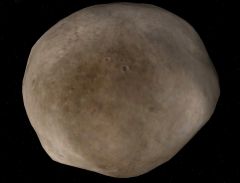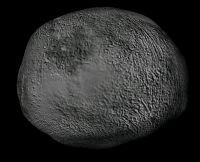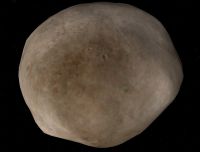4 Vesta
| 4 Vesta | |
|---|---|

| |
| 4 Vesta from AsteroidPack_v1.00.zip in Orbiter 2003P2 | |
| Designation | |
| Name | 4 Vesta |
| Reference body | Sun |
| Planetary mean orbits | |
| Epoch | 2006 |
| Semimajor axis (a) | 353 261 879 345.975 m |
| Eccentricity (e) | 0.0890394155076459 |
| Inclination (i) | 7.133373134° (0.124500847960143 radian) |
| Longitude of the ascending node (LAN, ☊) | 103.9258891° (1.81384894200928 radian) |
| Longitude of periapsis (ϖ) | 254.2243352° (4.4370516871193 radian) |
| Mean longitude (L) | 469.6544222° (8.19701601450406 radian) |
| Selected physical parameters | |
| Mean radius | 234000 km |
| Mass | 2.7×1020 kg |
| Rotation elements | |
| SidRotPeriod | 19232.64 seconds (5.3424 hours) |
| SidRotOffset | 0 |
| Obliqutiy | 0.004014257 |
| LAN | 0 |
| Note | *Elements given are from 4 Vesta.cfg (AsteroidPack_v1.00.zip) |
4 Vesta was discovered on 29 March 1807 by Heinrich Wilhelm Obers, and was at first classified as a planet, at least until it was realized that there are many small bodies in the area between Mars and Jupiter, at which time they were reclassified as asteroids,
4 Vesta in Orbiter
4 Vesta was first introduced with the release of MainBeltAsteroids051403.zip in May 2003. Note that the landing surface as given in the config file is spherical, but the visual of Vesta is not, if you land, you will likely be above or below the visual surface.
| Add-on | Source | Version | Author | Type | Release Date | Compatibility | Wiki article |
|---|---|---|---|---|---|---|---|
| Asteroid Pack 1.00 | O-F Resources | 2004-11-21 | Nighthawke | Scenery | 21 November 2004 | ||
| Main Belt Asteroids v1.0 | O-F Resources | v1.0 | Unknown OHM Addon Developer | Scenery | 14 May 2003 | ||
See also
Gallery
Vesta imaged by the Dawn spacecraft on 24 July 2011
| edit The Solar System | |
|---|---|
| Central star |
Sun (Sol) |
| Planets |
Mercury - Venus - Earth - Mars - Jupiter - Saturn - Uranus - Neptune |
| Natural satellites |
Moon - Phobos - Deimos - Io - Europa - Ganymede - Titan - more... |
| Add-ons |
Planets - Dwarf Planets - Small objects - Natural satellites - Alternative star systems |


